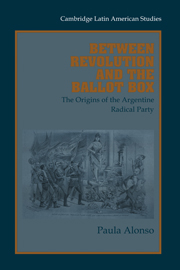Book contents
- Frontmatter
- Contents
- Acknowledgments
- List of Abbreviations
- List of Tables and Figures
- Introduction
- 1 The Political Arena
- 2 Mounting an Opposition
- 3 The Short-Lived Unión Cívica
- 4 The Radicals in Action: Part I
- 5 The Radicals in Action: Part II
- 6 The Decline of the Radical Party
- Conclusion
- Appendix 1 A Chronology of Political Parties and Factions, 1862–1910
- Appendix 2 Details of the Members of the National Committee of the UCR in 1892
- Appendix 3 Property Values in Buenos Aires, 1890–1898
- Bibliography
- Index
6 - The Decline of the Radical Party
Published online by Cambridge University Press: 05 August 2011
- Frontmatter
- Contents
- Acknowledgments
- List of Abbreviations
- List of Tables and Figures
- Introduction
- 1 The Political Arena
- 2 Mounting an Opposition
- 3 The Short-Lived Unión Cívica
- 4 The Radicals in Action: Part I
- 5 The Radicals in Action: Part II
- 6 The Decline of the Radical Party
- Conclusion
- Appendix 1 A Chronology of Political Parties and Factions, 1862–1910
- Appendix 2 Details of the Members of the National Committee of the UCR in 1892
- Appendix 3 Property Values in Buenos Aires, 1890–1898
- Bibliography
- Index
Summary
Although the UCR had initially survived the revolutionary defeats of 1893, and even gained popularity during 1894, the party gradually lost ground. The radicals became divided in their loyalties and in their plans for the party's future. The party had moderated its rhetoric and had lost its old confrontational character without successfully developing a new identity. The radicals' behavior in Congress had disappointed the public, as they became mere observers in the struggle for power between Roca and Quintana. The party also suffered electoral defeats in the capital in 1895 and in both the capital and the Province of Buenos Aires in 1896. The PAN, on the other hand, was finally making a recovery. This was marked by the resignation of Luis Sáenz Peña in January 1895. By 1896, all the provinces, with the exception of San Luis, Corrientes, and Buenos Aires, were under the control of the PAN. Roca had restored his authority over the PAN's national coalition and it was by then certain that the next president for the period 1898–1904 would belong to the roquista sector of the party.
While the PAN was recovering, the UCR was, by 1896, a party in decline. The Radical Party had been founded during a crisis in the PAN in 1890, and now that the PAN was regaining its strength the radicals were losing supporters throughout the country and its survival was threatened by internal difficulties.
- Type
- Chapter
- Information
- Between Revolution and the Ballot BoxThe Origins of the Argentine Radical Party in the 1890s, pp. 179 - 204Publisher: Cambridge University PressPrint publication year: 2000

